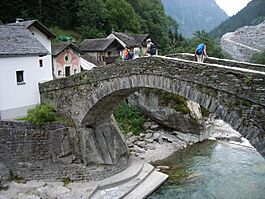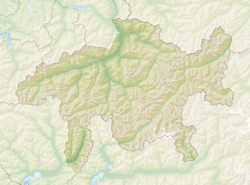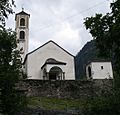Arvigo facts for kids
Quick facts for kids
Arvigo
|
||
|---|---|---|
 |
||
|
||
| Country | Switzerland | |
| Canton | Graubünden | |
| District | Moesa | |
| Area | ||
| • Total | 17.01 km2 (6.57 sq mi) | |
| Elevation | 876 m (2,874 ft) | |
| Population
(Dec 2013)
|
||
| • Total | 87 | |
| • Density | 5.115/km2 (13.25/sq mi) | |
| Postal code |
6543
|
|
| Surrounded by | Braggio, Buseno, Cauco, Cresciano (TI), Osogna (TI), San Vittore, Selma | |
Arvigo was once a small town, also called a municipality, located in the Moesa district in the southern part of Swiss canton of Graubünden. It is very close to the Ticino canton. On January 1, 2015, Arvigo joined with three other nearby towns: Braggio, Cauco, and Selma. Together, they formed a new, larger municipality called Calanca.
Contents
A Look Back: Arvigo's History
Arvigo is an old place! We know it existed as far back as 1453. That's when its name, Arvicho, was first written down in history books.
Exploring Arvigo's Geography
Before it merged, Arvigo covered an area of about 17 square kilometers (about 6.5 square miles). A good part of this land, about 53.4%, was covered by forests. About 11.9% of the land was used for farming. Only a small portion, 1.5%, had buildings or roads. The rest of the land, about 33.1%, was made up of things like rivers, glaciers, or mountains.
Arvigo was located in the Calanca sub-district, which is part of the Moesa district. It was known as the main town of the Val Calanca valley. It was also home to the local District Court, where important legal decisions were made for the area. Besides the main village of Arvigo, it also included the small village of Landarenca since 1980.
Who Lives in Arvigo? (Demographics)
In 2013, Arvigo had a population of 87 people. A little less than one-third of the people living there (29.5% in 2008) were from other countries. Over ten years, the number of people living in Arvigo went down by about 8.8%.
Most people in Arvigo speak Italian. In 2000, about 78.3% of the population spoke Italian. German was the second most common language, spoken by 10.9% of the people. Portuguese was the third most common, spoken by 5.4%.
In 2000, there were slightly more males than females in Arvigo. About 54.8% of the population was male, and 45.2% was female.
The people of Switzerland are generally well-educated. In Arvigo, more than half of the adults (53.1% of those aged 25-64) had completed either high school or gone on to higher education, like a university.
Arvigo had a low unemployment rate of 1.85%. This means most people who wanted to work had jobs. In 2005, there were 11 people working in farming and related businesses. There were 89 people working in manufacturing and construction, and 9 people working in services like shops or offices.
How Arvigo's Population Changed Over Time
The table below shows how the number of people living in Arvigo has changed throughout history. This includes the village of Landarenca.
| year | population |
|---|---|
| 1691 | 400 |
| 1733 | 352 |
| 1850 | 110 |
| 1900 | 226 |
| 1950 | 152 |
| 1960 | 131 |
| 1970 | 150 |
| 1980 | 112 |
| 1990 | 115 |
| 2000 | 92 |
| 2010 | 97 |
Images for kids
-
An Ossuary, a place where bones are kept.
See also
 In Spanish: Arvigo para niños
In Spanish: Arvigo para niños
 | Emma Amos |
 | Edward Mitchell Bannister |
 | Larry D. Alexander |
 | Ernie Barnes |







